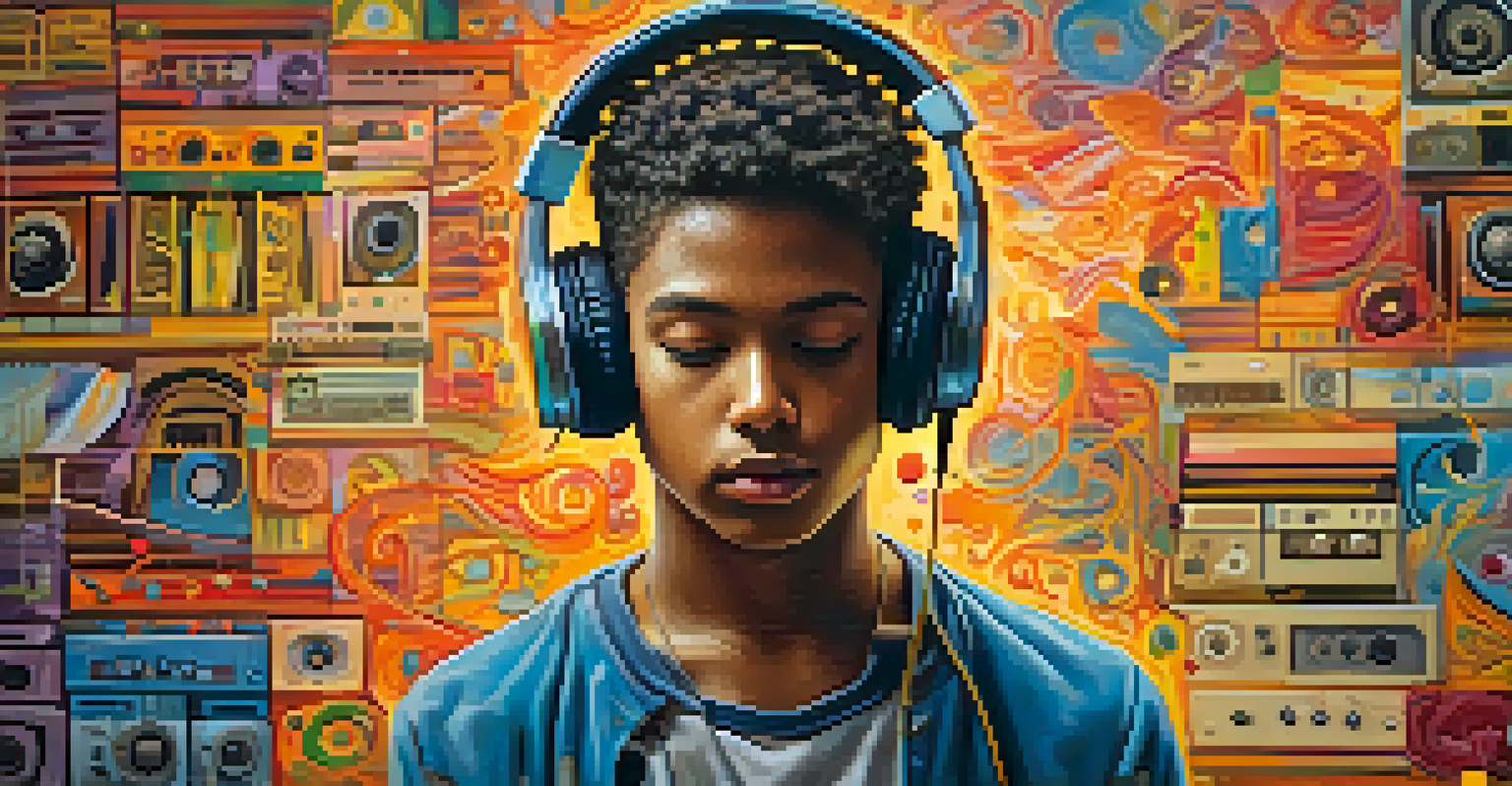The Role of Music in Cultural Identity and Expression

Music as a Reflection of Cultural Heritage
Music often serves as a mirror, reflecting the rich tapestry of cultural heritage. It encapsulates the stories, values, and traditions that have been passed down through generations. For instance, traditional folk songs can highlight the unique narratives of a community, preserving its history and identity in sound.
Music is the universal language of mankind.
Furthermore, these musical forms often employ local instruments and languages, grounding them in specific cultural contexts. They create a sense of belonging and pride among community members, reinforcing their connection to their roots. As such, music becomes a vital tool for cultural preservation.
Consider how indigenous songs often convey not only history but also spiritual beliefs and practices. This deep connection illustrates how music is not just entertainment; it's a vital expression of identity that can foster unity and resilience within cultures.
The Role of Music in Social Movements
Music has always played a pivotal role in social movements, serving as an anthem for change and a rallying cry for justice. From the civil rights movement in the United States, marked by songs like 'We Shall Overcome,' to anti-apartheid anthems in South Africa, music has empowered voices seeking equality and reform.

These songs often encapsulate the emotions and struggles of the people, making complex issues more accessible and relatable. They create a collective identity among activists, helping to unify diverse groups under a common cause. In this way, music transcends language barriers and speaks directly to the heart.
Music Reflects Cultural Heritage
Music serves as a vital expression of cultural identity, preserving the stories and traditions of communities.
Moreover, the impact of music in social movements continues today, with artists using their platforms to address current issues. This ongoing relationship between music and activism illustrates how powerful melodies can spark conversations and inspire action within society.
Music's Influence on Personal Identity
Beyond cultural and social contexts, music significantly shapes personal identity. The genres we resonate with often reflect our personalities, experiences, and emotions, creating a unique soundscape for each individual. For example, a teenager might gravitate towards punk music as a form of rebellion, while another may find solace in classical pieces.
Without music, life would be a mistake.
This connection to music can offer a sense of belonging, especially during formative years. Playlists and favorite albums become personal soundtracks that accompany life's ups and downs, providing comfort and understanding when needed most. It's no wonder that people often associate certain songs with specific memories or phases in their lives.
As individuals curate their musical tastes, they also communicate aspects of their identity to the world. From fashion choices influenced by favorite artists to the language used in lyrics, music becomes a canvas for self-expression, allowing people to share who they are and what they stand for.
Globalization and Musical Exchange
In our increasingly interconnected world, globalization has transformed how music is created, shared, and experienced. Artists now draw inspiration from diverse musical traditions, blending styles and genres to create something entirely new. This cross-cultural exchange enriches the musical landscape and fosters appreciation for different cultural expressions.
For instance, genres like reggaeton and K-pop showcase how traditional sounds can merge with modern influences, appealing to global audiences. Streaming platforms have made it easier than ever for listeners to explore music from around the world, breaking down cultural barriers and promoting diversity in musical tastes.
Music Fuels Social Movements
Throughout history, music has empowered social movements, uniting people under common causes and inspiring change.
However, this phenomenon also raises questions about cultural appropriation and authenticity. As we embrace musical fusion, it's crucial to honor the roots and contexts from which these sounds originate, ensuring that the original cultures are respected and celebrated in the process.
The Healing Power of Music
Music possesses an incredible ability to heal, offering solace during difficult times. Many studies have shown that listening to or creating music can reduce stress, alleviate anxiety, and even improve overall well-being. This therapeutic aspect of music transcends cultural boundaries, making it a universal language of comfort.
For example, many cultures incorporate music into healing rituals, using specific songs or rhythms to promote physical and emotional healing. This practice highlights the deep connection between music and mental health, illustrating how melodies can evoke powerful emotions and memories.
Moreover, participating in music-making—whether through singing, playing an instrument, or dancing—can foster community and connection. These shared experiences create bonds among individuals, reinforcing the idea that music is not just an individual pursuit but also a collective journey toward healing.
Music and Identity in the Digital Age
The digital age has revolutionized how we experience and interact with music, impacting cultural identity in profound ways. With the rise of social media and streaming platforms, artists can reach global audiences without traditional barriers. This accessibility allows for a more diverse representation of cultural identities in the music industry.
Listeners now have the power to curate their musical experiences, discovering artists from all corners of the world. This has led to a more eclectic mix of sounds and influences, where genres blend seamlessly, reflecting the complexities of modern identity. Yet, it also raises questions about the commercialization of culture and the dilution of traditional sounds.
Digital Age Shapes Musical Identity
The rise of digital platforms has transformed music consumption, allowing for a diverse blend of cultural influences and personal expression.
As music continues to evolve in this digital landscape, it remains a potent form of self-expression. Artists leverage online platforms to share their stories and cultural backgrounds, creating spaces for dialogue and connection, reminding us that music is a vital thread in the fabric of our identities.
Conclusion: The Enduring Legacy of Music
As we explore the role of music in cultural identity and expression, it's clear that its influence is both profound and enduring. From reflecting cultural heritage to sparking social movements, music serves as a powerful medium for individuals and communities alike. It not only shapes our identities but also connects us across time and space.
The beauty of music lies in its ability to adapt and evolve while remaining a constant source of inspiration and healing. As we continue to navigate the complexities of our world, music will undoubtedly play a crucial role in fostering understanding and appreciation for the rich diversity of human experience.

Ultimately, whether through traditional folk songs, modern anthems, or personal playlists, music remains an essential part of our cultural identity. It has the power to unite us, remind us of our roots, and help us express who we are in an ever-changing landscape.